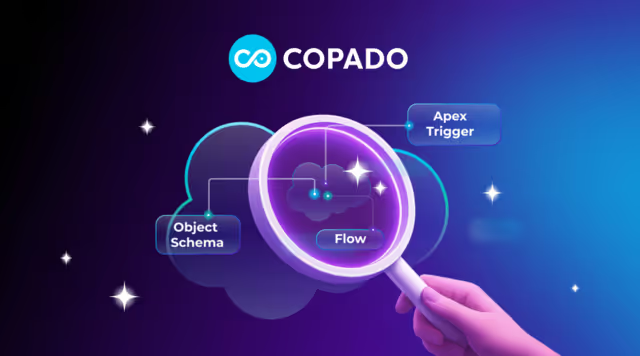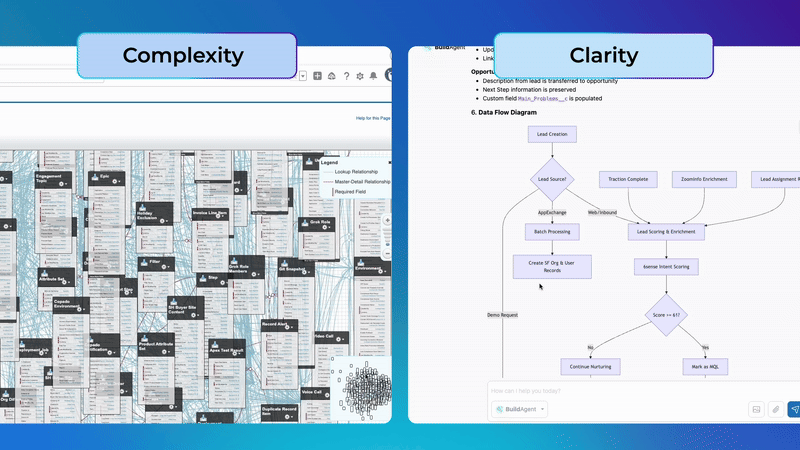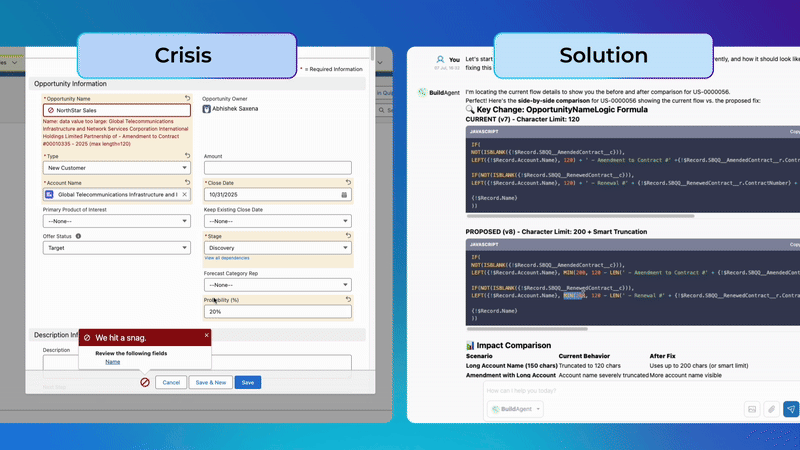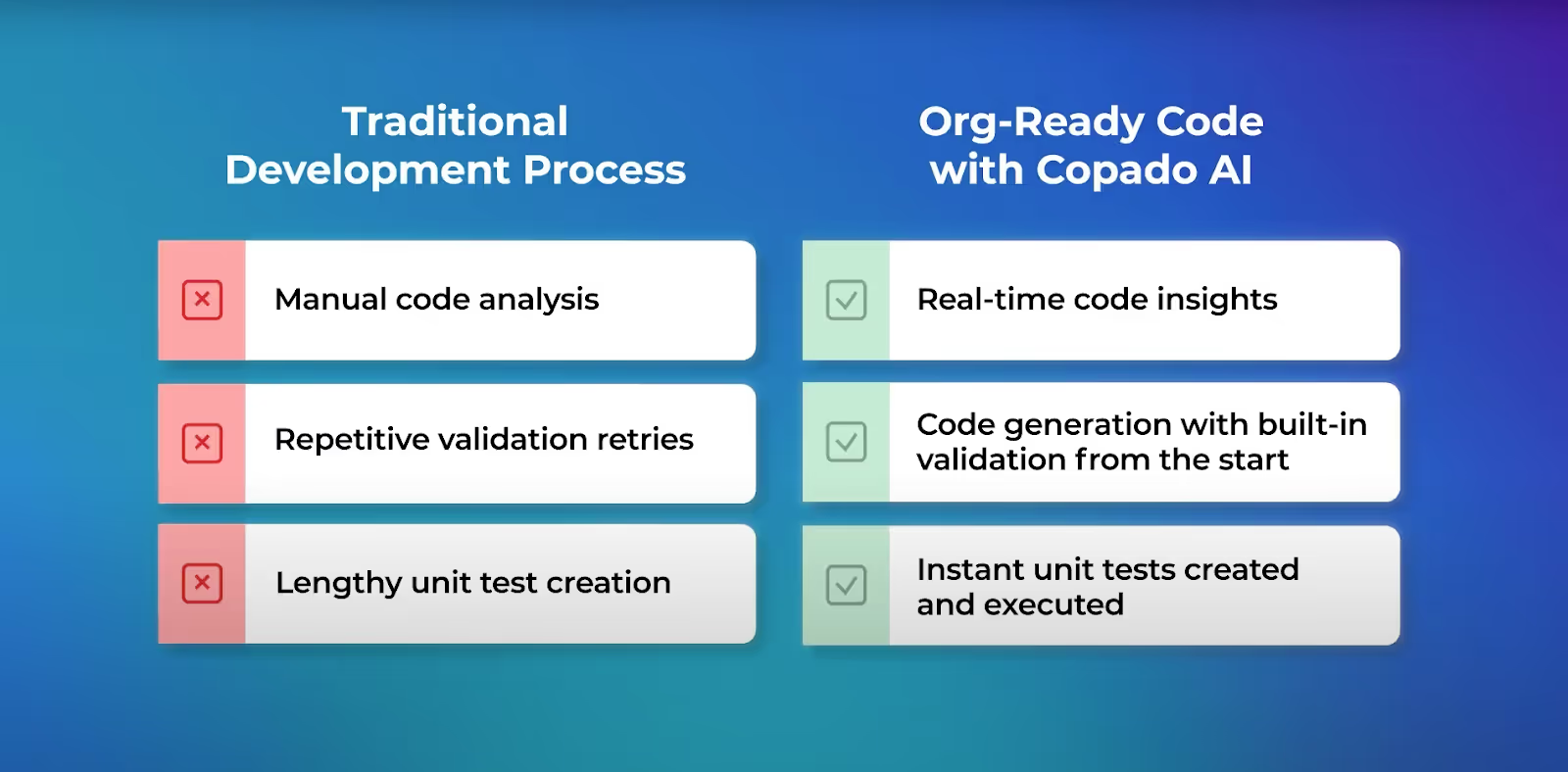

.svg)
.svg)
Salesforce has become the heartbeat of digital transformation for thousands of companies. From apps and flows to the rise of AI agents, Salesforce teams are expected to deliver more innovation at faster speeds, without sacrificing trust or quality.
But with growth comes complexity. Enterprises run orgs with years of customizations, sprawling metadata, and overlapping automations. For developers, admins, and architects, simply understanding an org can take weeks. For leaders, it creates blind spots that slow projects and increase risk.
That’s why Copado introduced the concept of Org Intelligence. Not as a buzzword, but as the foundation of a smarter, AI-powered approach to Salesforce DevOps.
When we coined the term Org Intelligence, the goal was simple: eliminate guesswork in Salesforce development.
Org Intelligence isn’t just a daily snapshot of your org’s metadata or an audit trail of the changes in your org. It’s using all of your code, configuration, work items, best practices and then using them as a context for your personal team of AI agents. These agents help you across the 5 phases of Software Delivery (Plan, Build, Test, Release and Operate.
Think about what that means for a team:
Org Intelligence bridges the gap between business and technical teams, providing a shared source of truth. It doesn’t just surface problems. It helps teams solve them.
Let’s break it down into three core capabilities that define Copado’s Org Intelligence:

Traditional Salesforce discovery is slow, manual, and fragmented. Teams spend hours digging through setup menus to understand relationships and dependencies.
With Org Intelligence, you gain instant clarity. AI-powered diagrams and insights show how applications, data models, and automations fit together. What once took weeks of investigation now takes minutes — enabling faster onboarding, better architectural decisions, and smoother collaboration.

Production issues are costly. But diagnosing them in Salesforce can feel like solving a puzzle without all the pieces.
Org Intelligence transforms troubleshooting. By understanding the metadata and configurations of your org, Copado AI can pinpoint root causes and suggest targeted resolutions. Teams cut downtime by 50% and keep users productive.

Code written without org context often fails at validation, leading to rework, delays, and technical debt.
Copado Org Intelligence generates high-quality, deployment-ready code that’s aligned with your org’s metadata. With built-in unit testing and validation, developers can trust that code will work the first time. That means faster delivery and fewer bottlenecks.
Other vendors have begun using the term “Org Intelligence.” But apart from the name, what they offer is nothing like Copado AI.
Their so-called “Org Intelligence” is essentially an audit trail snapshot, an existing feature rebranded. It provides basic monitoring and AI-generated descriptions of metadata, but it doesn’t extend to org discovery, issue resolution, code generation, or AI-driven recommendations.
It also has a narrowcmc value. Admins and developers may find some use in scrolling metadata lists, but business analysts, testers, and leaders won’t. It’s not built to bridge teams or accelerate delivery.
Rather than just surfacing information, Copado Org Intelligence turns that information into action. That’s the difference between seeing complexity and actually managing it.
Our customers are already proving the power of Org Intelligence.
These aren’t edge cases. They’re the new normal for teams that embrace Org Intelligence.
One of the strengths of Org Intelligence is that it delivers value across roles:
By making complexity manageable for every persona, Org Intelligence becomes a multiplier for Salesforce innovation.
Salesforce isn’t standing still. With AI agents like Agentforce, more automation, and growing ecosystems, complexity will only increase. Teams that rely on manual discovery and static tools will struggle to keep up.
Org Intelligence is built for this future. It scales with complexity, applies AI where teams need it most, and embeds trust into every release.
At Copado, we’re proud to have pioneered this category. More importantly, we’re committed to evolving it, continuing to deliver the intelligence that Salesforce teams need to build, test, and release with speed and confidence.
Org Intelligence isn’t about dashboards. It isn’t about static reports. It’s about turning complexity into clarity and clarity into action.
That’s the vision Copado started with. That’s the capability we’ve delivered to thousands of Salesforce teams. And that’s why we believe Org Intelligence is the foundation for the next generation of Salesforce DevOps.
Because Salesforce isn’t slowing down. And with Org Intelligence, neither do you.
Explore our DevOps resource library. Level up your Salesforce DevOps skills today.

.avif)


.svg)
